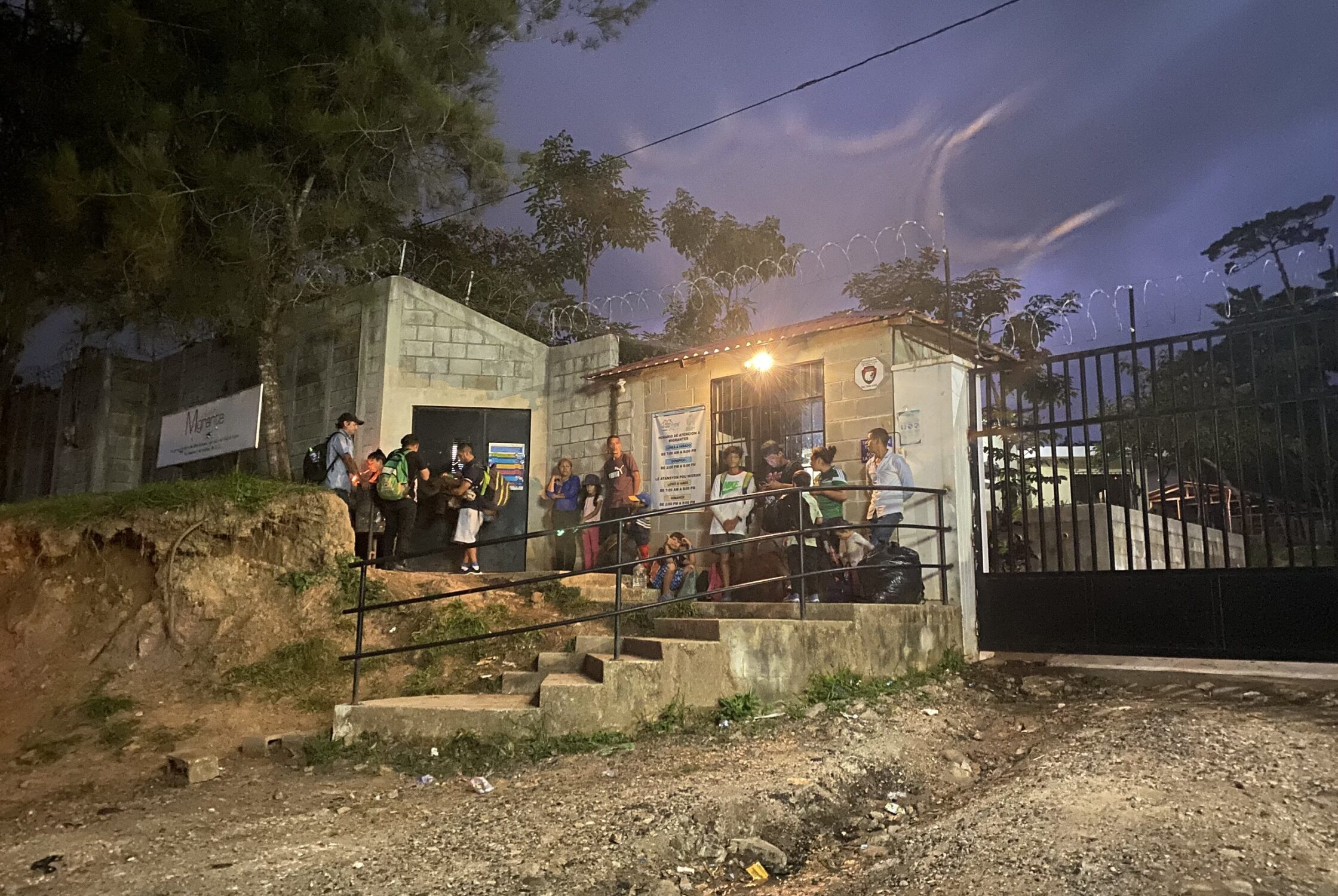Refugees International Eyewitness: Pushbacks of Venezuelans on the Guatemalan Border

On October 7, 2022, a Refugees International team visited the town of Esquipulas, Guatemala, on the border with Honduras to learn about the experiences of people on the move northward through the Americas.
That evening, we witnessed several groups of Venezuelans arrive at the Casa del Migrante (migrant shelter) in Esquipulas. Many were families with young children, including a 10-month-old infant. Several Venezuelan men discussed taking a bus over the border from Honduras into Guatemala. In Guatemala, the Guatemalan police asked them to pay bribes to continue their journey north. Although they paid the bribes, the police promptly returned then over the border to Honduras. Some Venezuelans said this happened to them three separate times. One Venezuelan man wanted to file a police report regarding the corruption he and his group experienced, but was unaware of how to do so.
In the growing darkness and rain, we watched additional groups of Venezuelans walking along the highway towards the shelter. They were worried. After traversing several countries and the Darién Gap, they did not know if they would be able to make it through Guatemala—given police enforcement along the highway and their lack of remaining funds—to cross into Mexico and eventually reach the United States. This was a devastating blow for many after weeks of traveling, often by foot, to get to this point.
While the journey north is extremely difficult, most Venezuelans interviewed at the shelter said they made it across previous borders without being expelled by government officials, although many were forced to bribe officials or take irregular routes to cross. It was upon reaching Guatemala where this group first experienced involuntary returns across a border.
Why are Venezuelans Being Expelled from Guatemala?
Central Americans from Nicaragua, Honduras, and El Salvador can enter Guatemala through the CA-4 agreement, which stipulates freedom of movement throughout CA-4 countries (including Guatemala), but Venezuelans do not have this same permission. Venezuelans must present, at minimum, a valid passport to enter Guatemala, and require a visa to enter Honduras legally, something most Venezuelans do not have. Venezuelan’s lack of documentation is a huge barrier for many to enter countries in the region, apply for visas, or access regularization options.
The Guatemalan authorities have steadily increased their pushbacks of Venezuelans with the support of U.S. government funding. Between January and October of 2022, the Guatemalan government expelled more than 9,500 Venezuelan migrants back to Honduras. Humanitarian organizations told us that their presence at the border prevented expulsions and facilitated the administration of protection screenings, but these are not consistent. Furthermore, the deteriorating human rights situation in Guatemala—including the resignation of the Human Rights Ombudsman—means less oversight of violations of the human rights of migrants in the country.
As More Venezuelans Make the Journey North, A Coordinated Regional Effort to Deter Venezuelan Migration
According to interviews our team conducted with international organizations while in Guatemala, Venezuelans made up the majority of people traveling through the country. This is a relatively new trend. During the first few years of the Venezuelan exodus that started around 2015, most Venezuelans moved within Latin America, settling in host countries like Colombia, Peru, and Ecuador. Increasingly, though, more Venezuelans are moving north towards the United States. Some depart directly from Venezuela, but many from other countries in the region.
After two years of the pandemic that devastated livelihoods, along with rising inflation, many Venezuelans are now struggling to make ends meet in countries throughout the region and are once again on the move. According to a new UN study, 4.3 million displaced Venezuelans in the region lack access to food, housing, and stable employment. Especially when compared to the response to Ukrainian or Syrian displacement, governments have provided only meager amounts of funding to countries hosting displaced Venezuelans and to international organizations helping them access affordable housing, health care, education, and jobs.
Visa restrictions in Mexico, Costa Rica, Honduras, and Panama starting in late 2021 and early 2022 forced Venezuelans to travel by land rather than fly. In 2022, more than 100,000 Venezuelans have made the journey through the dangerous Darién Gap to make their way north to the United States in the hopes of finding stability and safety.
What our team witnessed is part of a coordinated regional effort to deter Venezuelan migration. On October 12, the United States unveiled a parole program for Venezuelans limited to 24,000 people and linked to the expulsion of all other Venezuelans who cross the U.S. border. Implementation of the policy resulted in 5,000 expulsions of Venezuelans to Mexico in less than a week. On October 24, Panama instituted a new policy that requires a permission for Venezuelans to enter the country, another blow for Venezuelans looking to make their way north. In a concerning policy development, as of October 25, Mexico is now coordinating with Venezuela to facilitate return flights for undocumented Venezuelans in Mexico.
After meeting them at the shelter in Esquipulas, the Refugees International team kept in touch with a Venezuelan family of two sisters and four children under the age of 10. They are currently waiting for documentation in Mexico to continue north on foot. Upon hearing the news of potentially being turned away at the U.S.-Mexico border, one of the sisters said, “It would make us so sad to be returned after everything we’ve suffered, especially with our babies.”
Venezuelans cannot return to Venezuela due to the terrible conditions in their home country. Countries in the Western Hemisphere must work together to ensure Venezuelans are provided protection and opportunity rather than pushing them back to danger.
Photo Caption: The Refugees International team meets with Venezuelan migrants at the Casa del Migrante in Esquipulas, Guatemala, on October 7, 2022. Photo Credit: Yael Schacher, Refugees International.